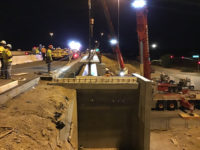Coronavirus and Construction
COVID-19 Intensifies Infrastructure Funding Problem, ASCE Says
The coronavirus pandemic is worsening the problem of infrastructure underinvestment, and the main solution is to increase federal spending in that area, a new American Society of Civil Engineers report says.
The 14-page ASCE report, released on June 24, notes the pandemic has resulted in a falloff in a variety of revenue sources that support infrastructure, such as gas taxes and other transportation fees, transit farebox receipts and airport income. [View ASCE report here.]
The study also says that “municipal and state budgets are buckling under unprecedented demands, meaning less support is available for parks, schools and other publicly owned infrastructure, precisely at the time we should be investing.”
[For ENR’s latest coverage of the impacts of the COVID-19 pandemic, click here]
ASCE is calling on Congress to make infrastructure spending “a centerpiece” of legislation to provide short-term emergency response and longer-range economic recovery in the wake of the pandemic.
The report has specific recommendations for each of several infrastructure sectors. Some proposals are the same as those made by industry and transportation organizations in recent months.
For example, for bridges and roads, the authors call for Congress to provide $50 billion for state departments of transportation and to come up with a long-term revenue fix for the struggling Highway Trust Fund.
The American Association of State Highway and Transportation Officials on April 6 asked Congress for $49.95 billion over the fiscal 2020-21 period. On June 5, AASHTO along with more than 40 other transportation and construction groups, made the same request of President Trump.
Addressing the Highway Trust Fund’s revenue problem has long been a priority of ASCE and other engineering, construction and transportation groups.
In the water sector, ASCE recommends relief for water ratepayers and for local water agencies hit with revenue losses. The group also calls for an additional $300 million per year in federal grants to support State Revolving Funds, a prime source of financing for drinking-water and wastewater-treatment facilities.
For schools, ASCE supports legislation to create a $70-billion grant program and $30 billion in tax-credit bonds to upgrade school buildings in economically disadvantaged neighborhoods.
For transit, which received $25 billion in the Coronavirus Aid, Relief and Economic Security, or CARES, Act, ASCE is seeking an additional $23.8 billion to keep transit systems operating. That equals the amount that the American Public Transportation Association requested from Congress on May 7.
Some of the proposals are included in pending congressional legislation. For example, the House-passed Health and Economic Recovery Omnibus Emergency Solutions, or HEROES, Act, includes $15 billion for state DOTs.
House Democrats’ recently introduced $1.5-trillion infrastructure package includes increased funding for highways, transit, water, schools and other infrastructure categories. A House floor vote on the bill is expected before the July 4 recess.
But the Republican-controlled Senate has yet to act on the HEROES bill or a comprehensive infrastructure package.
The Senate has taken some action on infrastructure legislation, with highway and water infrastructure measures cleared by the Environment and Public Works Committee. None of those measures has come to the Senate floor yet, however.



